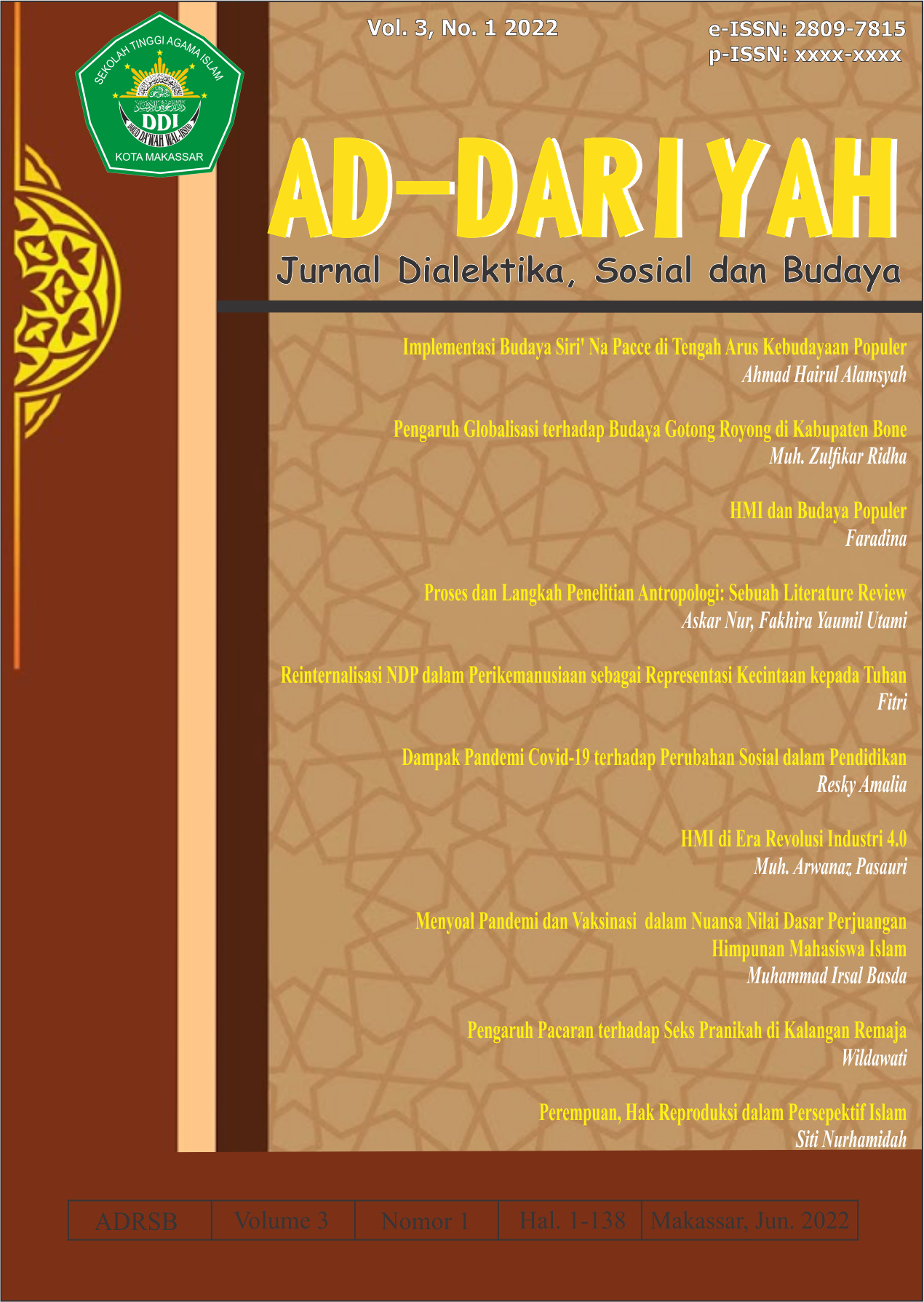HMI dan Budaya Populer
DOI:
https://doi.org/10.55623/ad.v3i1.108Kata Kunci:
HMI, Society, Popular Culture, Media, NKRIAbstrak
This journal discusses the correlation and transformation of the Human Rights Organization and National Culture that occurs in the scope of the organization and in Indonesia, and makes it an intellectual benchmark in understanding cultural values in the current era. When talking about popular culture means inseparable from the actions of society. Society is a group of people who live together in an area and form a system, both semi-open and semi-closed, where the interactions that occur in it are between individuals in the group. Popular culture represents the way of life that the average person enjoys and has. Culture is said to be popular if it always experiences artistic development, it is attractive and commercial in nature and can be used to express and understand the wider community. In the process of popular culture, the media also plays a role as the dissemination of information and entertainment technology, as well as an institution that creates and controls the commodity market in a social environment. The purpose of this research is also to be used as a reference for students as HMI cadres when discussing the insight of the archipelago in national culture and popular culture in the Unitary State of the Republic of Indonesia.
Referensi
Agustriono, et.al. 1996. Dampak Globalisasi Informasi Dan Komunikasi Terhadap Kehidupan Sosial Budaya Masyarakat Di Daerah Sumatera Utara. Departemen Pendidikan Dan Kebudayaan
Sartono Kartodijo, 1987, “Gotong -royong: Saling Menolong Dalam Pembangunan Masyarakat Indonesia, dalam Callette, Nat.J dan Kayam, Umar (ed), Kebudayaan dan Pembangunan: Sebuah Pendekatan Terhadap Antropologi Terapan di Indonesia. Jakarta: Yayasan Obor.
Jary, David dan Jary, Yulia, 1991, Dictionary of Sosiology, Glasgow, Harper Collin Publisher, hal.22-23 Dalam Veeger.K.J (1985: 7-8)
Makmur, Z., Delukman, A., & Nur, A. Perempuan dalam Tubuh Laki-Laki Makassar; Sebuah proyeksi Pertunjukan Musik Inovatif Maskur Al-Alief,“Pasang dalam Bunyi-Bunyian Mangkasara”.
Nur, A. (2020). Mistisisme tradisi mappadendang di Desa Allamungeng Patue, Kabupaten Bone. Jurnal Khitah: Kajian Islam, Budaya dan Humaniora, 1(1), 1-16.
Nur, A. (2021). Bangku depan: Kumpulan Suara Terbungkam di Ruang Kuliah. Liyan Pustaka.
Nur, A., & Abdullah, M. S. (2022). Barru Literacy Community as the Alternative Literacy Movement: A Study on Cultivating Reading Literacy toward Society in Barru Regency, South Sulawesi Province. Salus Cultura: Jurnal Pembangunan Manusia Dan Kebudayaan, 2(1), 11–25. https://doi.org/10.55480/saluscultura.v2i1.41
Hanapi, S. R. R., & Nur, A. (2020). Budaya Konsumerisme dan Kehidupan Modern; Menelaah Gaya Hidup Kader Himpunan Mahasiswa Islam Cabang Gowa Raya. Jurnal Khitah: Kajian Islam, Budaya dan Humaniora, 1(1), 42-49.
Makmur, Z., Arsyam, M., & Alwi, A. M. S. (2020). Strategi Komunikasi Pembelajaran Di Rumah Dalam Lingkungan Keluarga Masa Pandemi. KOMUNIDA: Media Komunikasi dan Dakwah, 10(02), 231-241.
Makmur, Z., & Nur, A. (2021, February 22). Membaca Kesendirian Asmaul Husna dari Puisinya. https://doi.org/10.31219/osf.io/3fy7m
Makmur, Z., Arsyam, M., & Delukman, D. (2021). The Final Destination's uncomfortable vision to the environmental ethics. Journal of Advanced English Studies, 4(2), 76-82.
Nur, A. (2020). Interelasi Masyarakat Adat Kajang dan Pola Kehidupan Modern.
Nur, A. (2021). The Culture Reproduction In the Charles Dickens’ Novel “Great Expectations” (Pierre-Felix Bourdieu Theory). International Journal of Cultural and Art Studies, 5(1), 10-20. https://doi.org/10.32734/ijcas.v5i1.4866
Nur, A. (2021, December). GHAZWUL FIKR AND CAPITALISM SPECTRUM: ISLAMIC STUDENTS ON OLIGARCHY SHADES. In Proceedings of the International Conference on Social and Islamic Studies (SIS) 2021.
Syam, M. T., Makmur, Z., & Nur, A. (2020). Social Distance Into Factual Information Distance about COVID-19 in Indonesia Whatsapp Groups. Jurnal Ilmu Komunikasi, 18(3), 269-279





